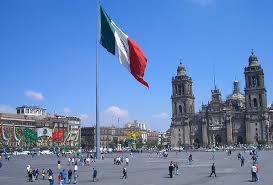By Joseph Sette
During my COIL experience, my class had the opportunity to listen to “Where is your brother?” This lecture was presented by Andrés Porras Gutiérrez, a guest speaker from Monterrey, and focused on migration experiences. His presentation not only reflected on personal stories of hardship for people within the migration process, but also brought potential suggestions on how we as a community can tackle these challenges.
Gutiérrez began his lecture with a question for us students to answer. “If today you had to leave your home for good, and you could take one backpack with only five items… What would you choose?” Each of our classes were given thirty seconds to come up with whatever items we could think of. I had to think both logically and realistically. My five items included:
1. Blanket
2. Canteen to hold water
3. First aid kit
4. A pair of sneakers
5. Some sort of identification
To me, these seemed to be the most reasonable to take on an ambiguously long journey from home. After time was up, several students raised their hands and mentioned one of their items. Some said some source of ID and first aid, while others said things like cellphones and clothing. Gutiérrez explained that for many migrants, thirty minutes was not enough, and that many were forced to move with even less items to carry on their backs. He presented several photographs of abandoned objects his group found along their journey. The images included things like bags, baseball caps, medicines, snacks, shoes, bottles, and hygiene supplies. The photos made me think about how fortunate I am to live in a place where I am not forced to grab what I can and flee to somewhere else in hopes of safety.
Gutiérrez introduced a man whom we had met on his journey. His name was Arturo, a 33-year-old man who had been travelling for 18 years. He had left his home when he was only 15 years old and, at the time he spoke with Gutiérrez, was still in the process of travelling. He is forced to continue moving because he was deported from the United States. Gutiérrez says that “Arturo wants nothing more than to find a stable job and to be rooted to a place, but he has not achieved it.” He asked Arturo what he has in his backpack, and he replied, “Some clothes, my birth certificate and a Bible.”
As a class, we were called to question the essential parts of our lives, and the things that we value the most. I thought of my family, my friends, and my individuality. Gutiérrez emphasized the idea that “A life is a life,” and that all people should have the same level of worth in their lives as everyone else. He recalled current concerns today, such as the war between Russia and Ukraine, the hostilities between Palestine and Israel, and the immigration problems across the globe. These concerns, alongside other issues like persecution and climate changes, have forced many individuals to become migrants, fleeing their homes in pursuit of new ones. Relating to this, I learned about the Darién Gap, a strenuous trek connecting Panama and Colombia, which as many as 250,000 migrants cross to make their journeys. These people make such dangerous ventures, only to be met with obstacles and exploitations by national policies.
So, what can be done to assist migrants as they set about to find safety and asylum? Gutiérrez makes 3 possible suggestions. First, he tells us to approach them. Migrants are humans made the exact same way we are. Words like “alien” try to devalue migrants as people. As human beings, we must approach these individuals at common ground, and offer them respect, justice, and compassion. Secondly, Gutiérrez says to be supportive as a society instead of waiting for governmental action. This calls us as a community to enact change that benefits migrants and their individual rights. This can be done through addressing exploitative regulations and advocating for ethically justified mandates. Lastly, he calls for the integration of a different culture in our countries that removes any prejudices that we might have towards migrants. Together, we must eliminate the biases towards migrants that have been instituted within our culture for centuries.
Gutiérrez’s presentation allowed me to get a closer look into the migration story, and what can be done not only at the national level, but at a personal level that I myself can participate in. As a human being, I must ensure the rights and dignities of my migrant neighbors to the best of my abilities. I can do this through spreading social awareness and teaching others on these issues, as well as joining campaigns that support migrant protection and denounce their rejection. At the end of the day, we are all brothers and sisters, despite being thousands of miles apart, under one Earth and one God.

